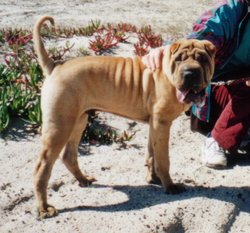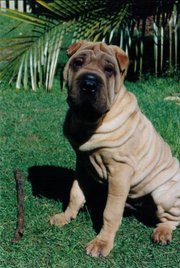From Wikipedia the free encyclopedia, by MultiMedia
| Shar Pei | |
|---|---|

Adult Shar Pei.
|
|
| Alternative names | |
| Chinese Shar Pei Chinese Fighting Dog |
|
| Country of origin | |
| China | |
| Common nicknames | |
| Classification and breed standards | |
| FCI: | Group 2 Section 2 #309 |
| AKC: | Nonsporting |
| ANKC: | Group 7 (Non-Sporting) |
| CKC: | Group 6 - Non-Sporting Dogs |
| KC (UK): | Utility |
| NZKC: | Non-sporting |
| UKC: | {{{ukcgroup}}} |
| Not recognized by any major kennel club | |
| This breed of Dog is extinct | |
| Notes | |
Shar Pei is a breed of Dog whose distinctive feature is deep wrinkles. The name (沙皮, pinyin: shā p) itself translates to "Sand Skin," not because of their colors, but because of their texture. As young puppies, they have lots of wrinkles, but as they mature, the wrinkles disappear as they "grow into their skin". They were not recognized by the American Kennel Club until 1991.
Appearance
The Chinese variety of Shar Pei looks like a Doberman Pinscher with small floppy ears, long legs, and a narrow face. Coming in many colors, it has the same characteristic blue-black tongue of the Chow Chow. The wrinkles are seen only on the face and back. Through selective breeding, the American variety of Shar Pei has very short, stubby legs, many wrinkles covering all of its body, and a wide "hippo face". The tail curls up and rests on the back.
Health
A common problem caused by irresponsible inbreeding is excessive wrinkling of the skin that causes an eye condition which turns the eyelashes inward, thus irritating the eye and possibly causing infection. This condition is called entropion and can be fixed by surgery ("tacking" the eyelids up so they won't roll onto the eyeball). Skin infections are also common in this breed due to the folds and wrinkles, as is dry, flaky skin which can be remedied by frequent bathing using a special shampoo. One of the causes of skin problems in the Shar Pei is feeding the Dog too much rich food; Shar Pei were developed in poor areas, and thus evolved to survive on very poor diets. As a result, the Dog has difficulty coping with high protein diets. High protein diets also increase the risk of a serious kidney disease called amyloidosis. The disease causes short fevers lasting 24 hours, after which there may be no more recurrence; alternatively they may recur at more frequent intervals, becoming more serious, and eventually resulting in kidney or liver failure. Susceptability to this disease is recessive, and surfaces when both of a Dog's parents carry it.
History
The Shar Pei breed comes from the Guangzhou province of China where it was well-known as a fighting and guard Dog. Originally, it was an all-purpose utility Dog of poorer farmers and had fewer wrinkles; when the British introduced Dog fighting to China in the late 19th century, it was the breed best suited for this purpose due to its size and strength. The Dogs were then bred with an increased number of wrinkles for their advantages in fighting; if the Dog was bitten on a wrinkle, it could still turn around and bite back. At one point they were close to extinction, and were listed in the Guinness Book of World Records as "The rarest Dog in the world". Since then, however, the Shar Pei has begun to thrive in many parts of the world as an excellent family Dog, due to their loving and devoted nature, which shows that they were originally a utility and companion breed rather than a fighting breed.
Recent DNA analysis has concluded that the Shar Pei is one of the most ancient Dog breeds.
 The same Shar Pei as a puppy. Note the greater amount of wrinkles.
The same Shar Pei as a puppy. Note the greater amount of wrinkles.
See also
Dogs, made by MultiMedia | Free content and software
This guide is licensed under the GNU Free Documentation License. It uses material from the Wikipedia.